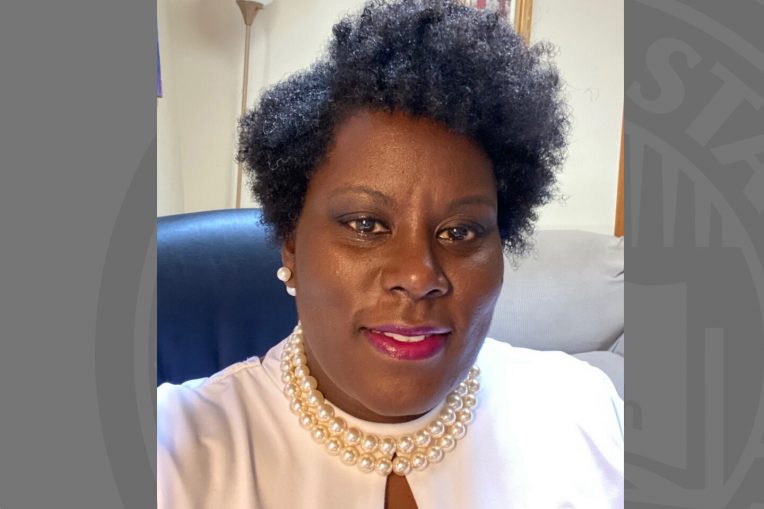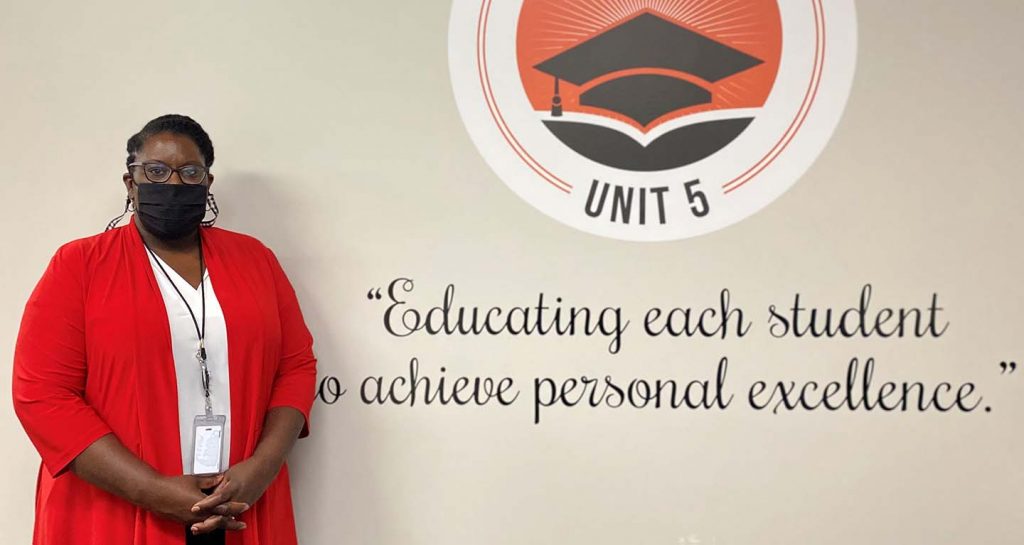Being the first at anything can be daunting. But for Dr. Kristal Shelvin, M.S. ’20, Ph.D. ’10, becoming Unit 5 Schools’ inaugural director of diversity, equity, and inclusion (DEI) was a natural fit.
“It’s an amazing combination of all of my different areas of training,” said the 2020 graduate of the Department of Educational Administration and Foundations’ (EAF) master’s degree in P-12 educational administration, also known as the principal preparation program.
In the position, she works with a vast group of stakeholders to make sure the district is creating equitable conditions, from learners to faculty and staff.
She quarterbacked an equity plan unveiled at the beginning of the fall 2021 semester that’s already improving the experiences of students in a district of over 12,000 students, good for 14th largest in Illinois. The community is split between rural, suburban, and urban settings, and with families who speak 30 different languages.
“The district is innovative and ambitious for committing to continuous improvement in this area by investing time and money in people and initiatives,” Shelvin said.
One of the other challenges she undertook early on was to unroot practices leading to the disproportionate number of Black students who received in-school suspensions and expulsions in the district.
“Students benefit socially, emotionally, behaviorally, and academically in a diverse school community. Public school staff’s identities rarely reflect student body and community diversity with respect to race, ethnicity, LGBTQIA identity, ability, and/or first language,” she said.
“DEI professionals help recruit and retain diverse staff while building the capacity for equitable and inclusive practices. The ultimate goal is to provide each student with optimal learning opportunities.”
Caught it early
Shelvin’s desire to improve student experiences harkens all the way back to her days as a middle schooler.
“In junior high, I realized that I loved a place everyone else said they hated. And so that just sparked my initial interest in trying to figure out how to make schools work for everyone. Because I knew that they could,” she said.
“For me, it has never been about the next job. It has always been about ‘What can I do for kids in a better way?’”
Dr. Kristal Shelvin
Admittedly, growing up in a family of educators influenced her perspective. In addition to her mother, who taught for 34 years, many of her relatives worked in higher education.
Shelvin’s first gig was in child welfare. The role required her to attend many Individualized Education Plan (IEP) meetings. She was struck by how often parents, teachers, and support staff couldn’t get on the same page despite sharing a common goal—to do what was best for children and students.
“Those meetings could be somewhat adversarial, and with my ‘schools are the greatest place to be’ hat on, I didn’t understand why these conversations had to be so tense,” she said.
Shelvin was determined to positively influence these meeting and relationships. But she knew she had more to learn. She decided to dip her toes into the counseling side of things by shadowing a school psychologist in Champaign.
“I was smitten with that work immediately, and so I went to Illinois State to earn a specialist degree in psychology,” she said.
Her ambitions grew quickly, and she went on to earn a doctorate in psychology.
For Shelvin, the work of a school psychologist position is vital for students at all levels, from pre-k through senior year of high school.
“As data-driven systems changers, school psychologists address individual student, classwide, schoolwide, and districtwide concerns,” she said.
“School psychologists help identify, implement, and evaluate the impact of creative solutions to these concerns. In the DEI space, these educational concerns include inequities and disproportionate outcomes for minoritized students.”
“Sometimes people are closer to their undergraduate institution. But I am much closer to my graduate institution.”
Dr. Kristal Shelvin
Road to leadership
Shelvin worked as a school psychologist in Rockford for several years before being tapped to lead a team of practitioners in Central Illinois. She excelled in those roles, but the reflective educator also wanted to squash her knowledge gaps in school leadership and systems.
That’s why the Ph.D. recipient made the humble decision to get her second master’s degree, a P-12 administration M.S. through the EAF department.
“For me, it has never been about not about the next job,” she said, “it has always been about ‘What can I do for kids in a better way?’”
Those EAF experiences were crucial to her effectiveness as a leader for Unit 5.
“The administrative degree from EAF advanced my understanding of school systems tremendously, including the human and legal systems,” she said.
She says the program gave her a crisper perspective on navigating the limitations of budgets and competing needs of educational communities.
“We have all these grand ideas of what we’d love to do, but there are constraints. I think that having that understanding, as well as my background as an advocate, and as a school psychologist, so basically as a gatekeeper, have provided me with the unique perspective to help people see that there’s more than one way to look at a situation.”
EAF experiences
While most of the students in her principal preparation cohort were teachers, Shelvin felt like the program also honored the value brought in from professionals coming from other areas of education, from school nurses to psychologists.
“They really pulled our experiences into the classroom conversation, but they also pushed us to increase our curriculum and instruction skills so that we could become instructional leaders for a building,” she said.
Shelvin appreciated the diversity of thought among EAF’s faculty members, as well.
“The professors were fantastic, and they were a nice mix of professors who were still practicing, like superintendents, and folks who were steeped in the research,” she said.
The flexibility of the course work was a huge factor in her deciding to enroll and successfully meet the expectations of the program. She also lauds the cohort-model, which she likens to a close-knit professional learning community.
Shelvin and her former classmates continue to lean on each other for support, and several are her colleagues in Unit 5.
It’s just one of the reasons she’s proud to be a two-time Redbird.
“Sometimes people are closer to their undergraduate institution,” she comments, “But I am much closer to my graduate institution.”


